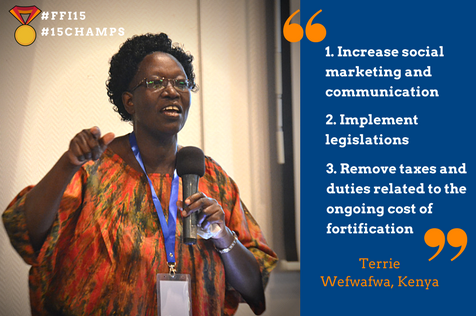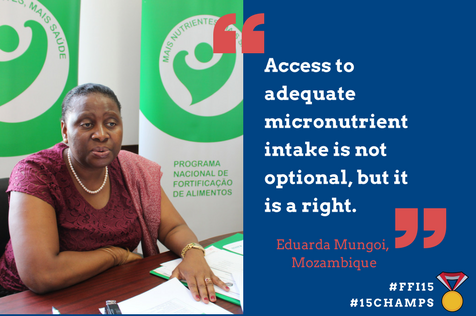Despite challenges posed by the pandemic, Egypt pushed ahead to restart the country’s wheat flour fortification program, on hold since 2014.
Read MoreHalf of the countries that fortify maize and wheat flours with iron, zinc and vitamin B12 may need to update their standards to meet the World Health Organization’s (WHO) current recommendations, according to a recent study published in Food Policy.
Read MoreTo prevent a rise in malnutrition as a result of the pandemic, countries need to maintain food systems and support large-scale interventions like the fortification of staple foods. The frontline of every country’s health system are the immune systems of its people.
Read MoreIn 2019, FFI assisted Mozambique in testing an online data collection and aggregation tool for fortification monitoring called FortifyMIS.
Read MoreOne of FFI’s innovative approaches to ensure high-quality fortified foods are available in Africa is a grassroots Pull Strategy.
Read MoreIn 2019, the Government of Egypt and FFI laid the foundation for restarting Egypt’s national wheat flour fortification program.
Read MoreThe John D. and Catherine T. MacArthur Foundation today unveiled the Food Fortification Initiative (FFI) and its partners’ proposal as one of the highest-scoring proposals, designated as the Top 100, in its 100&Change competition for a single $100 million grant to help solve one of the world's most critical social challenges.
Read MoreA Cochrane systematic review on the benefits and safety of fortifying wheat or maize flour with folic acid and population health outcomes, led by scientists in the Division of Nutritional Sciences at Cornell, found that fortification with folic acid (the synthetic form of folate) may improve folate status and reduce the occurrence of neural tube defects.
Read MoreA table which identifies the levels of 13 vitamin and minerals in 50 foods commonly consumed in Senegal is newly available. The food composition table, in conjunction with Household Consumption and Expenditure Surveys (HCES), can help estimate the potential nutrient contribution of food fortification programs.
Read MoreTwo-thirds of all countries mandate food fortification, yet many are not translating policy into improved nutrition, according to new data from the Global Fortification Data Exchange (GFDx) in English or in Spanish (en español). These countries are missing an opportunity to improve the health of children and mothers, bolster communities, and boost national economies.
Read MoreTo prevent a rise in malnutrition as a result of the pandemic, countries need to maintain food systems and support large-scale interventions like the fortification of staple foods. The frontline of every country’s health system are the immune systems of its people.
Read MoreA Cochrane systematic review on the benefits and safety of fortifying wheat or maize flour with folic acid and population health outcomes, led by scientists in the Division of Nutritional Sciences at Cornell, found that fortification with folic acid (the synthetic form of folate) may improve folate status and reduce the occurrence of neural tube defects.
Read MoreThe public policy planning forum that launched what became FFI was on 24 October 2002 in Mauritius. To celebrate our 15th birthday in 2017, we honored 15 fortification champions from different sectors and different parts of the world. An influential person who supports fortification is a key to success.
Read More














